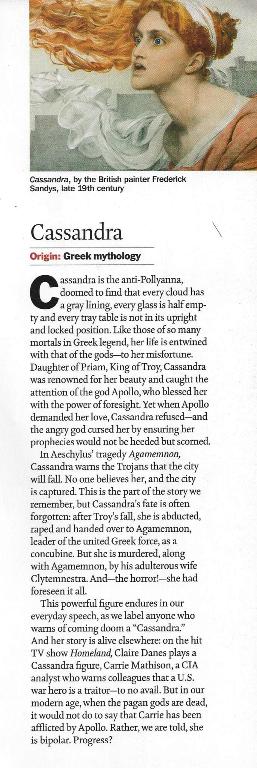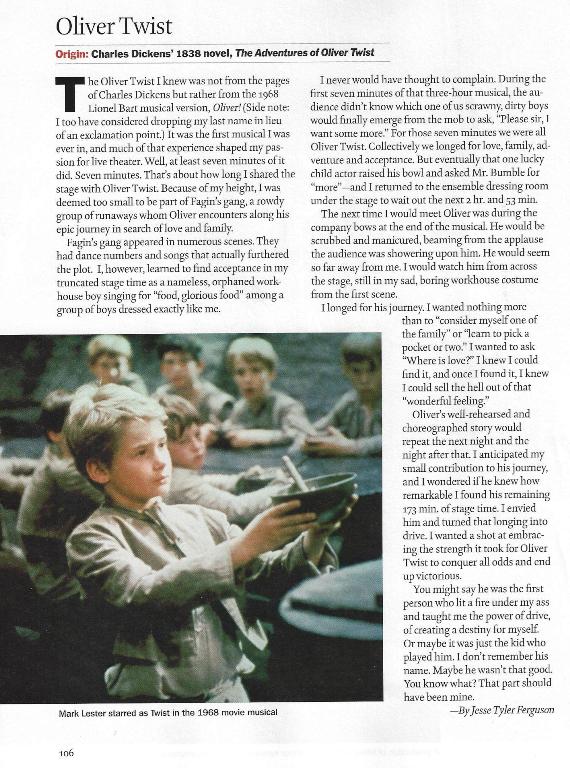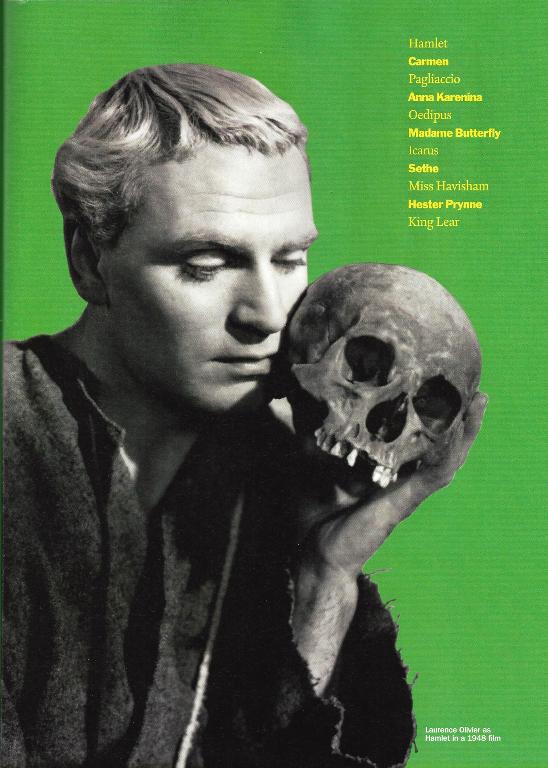|
|
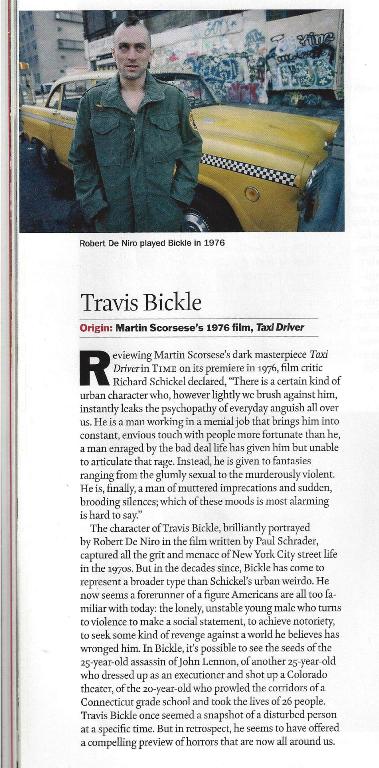 Time: The 100 most influential people who never lived, 100 người ảnh hưởng nhất chưa hề sống. 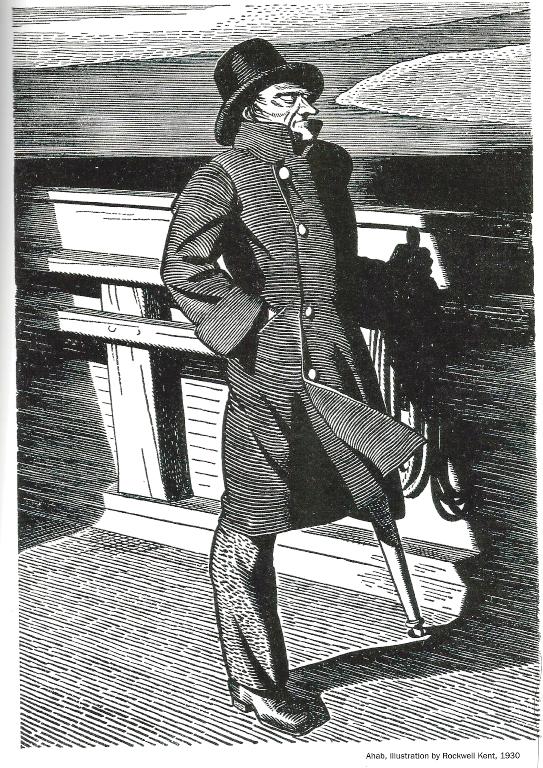 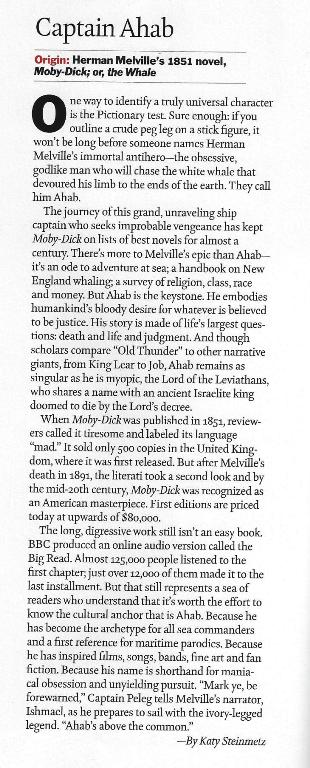 Cá voi trắng
có gì giông giống bộ xương cá trong Ngư Ông và Biển Cả, con K của
Buzzati.
Chúng là những versions của nhau, theo GCC. 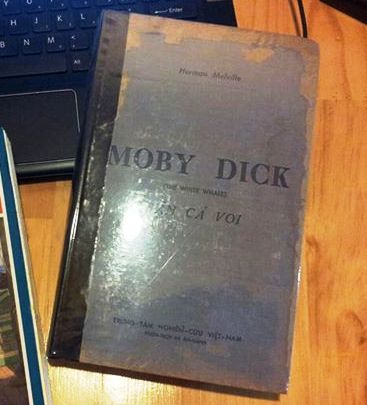 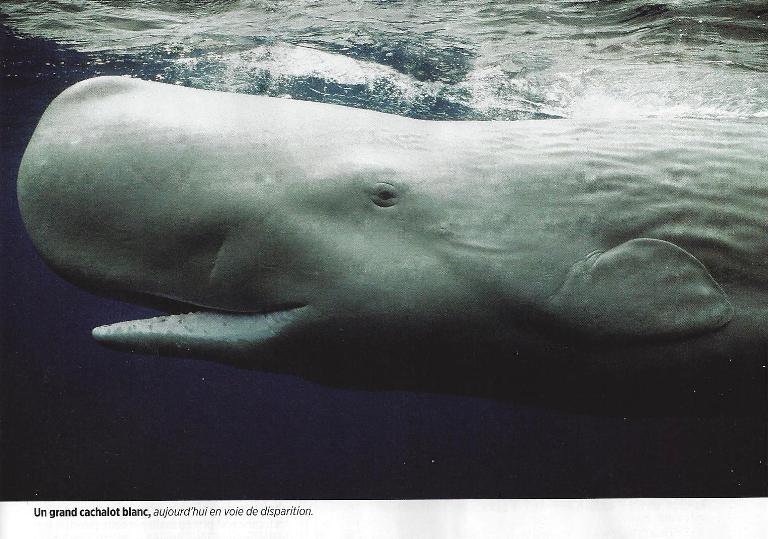 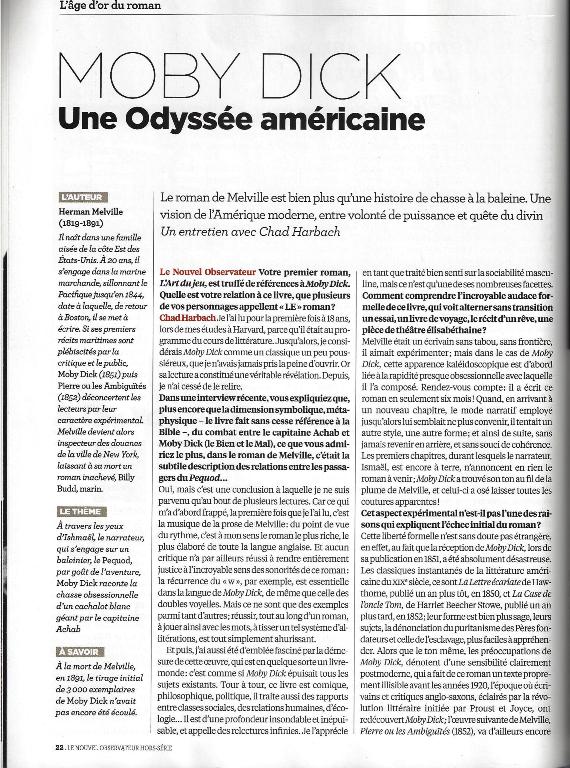 Cá Coi Trắng: Sử Thi Mẽo
Cuốn tiểu
thuyết của
Melville, hơn cả 1 câu chuyện săn cá voi, là viễn ảnh nước
Mẽo hiện đại, giữa "volonté de puissance" và "quête du
divin"Chính “cuộc tìm kiếm chất thánh", "quête du divin", làm nó giống “Ngư Ông và Biển Cả”, mà cội nguồn của nó là Thánh Kinh. Rushdie viết, Lần đầu tiên
tôi coi The Wizard of Oz, và
nó biến tôi thành nhà văn. 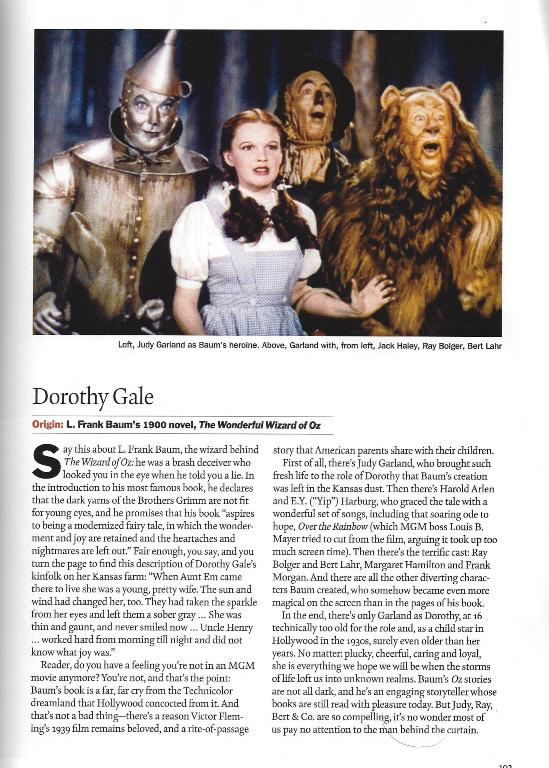 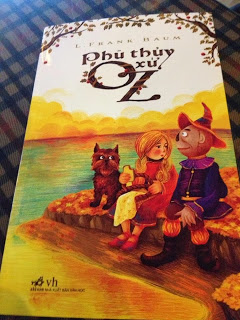 The fatwa, the four marriages, the party
image – Salman Rushdie has become known for more than his prizewinning
novels. But his sons are what matter most, so he has written a book for
teenagers He was the superstar of postcolonial
literature in the 1980s, the beleaguered poster boy for free speech in
the 1990s, as he scuttled from house to house accompanied by special
branch officers following the fatwa issued by Ayatollah Khomeini in
response to his novel, The Satanic Verses. But in the early years of
the 21st century Salman Rushdie underwent a curious metamorphosis to
become a figure of fun Note: Lệnh Xé Xác, 4 hôn nhân, đại gia -
Salman vượt quá hình ảnh nhà văn với những giải thưởng. Nhưng mấy đứa
con của ông, mới là mối bận tâm lớn nhất của ông, và thế là vào đầu
thiên niên kỷ, ông hoá thân thành một anh hề, viết truyện nhi đồng. 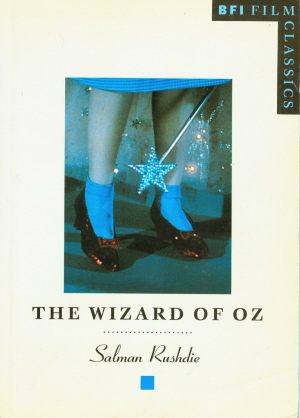 ‘The Wizard of Oz was my very first
literary influence,' writes Salman Rushdie in his account of the great
MGM children's classic. At the age of ten he had written a story, 'Over
the Rainbow', about a colorful fantasy world. But for Rushdie The Wizard of Oz is more than a
children's film, and more than a fantasy. It's a story 'whose driving
force is the inadequacy of adults', in which the 'weakness of grown-ups
forces children to take control of their own destinies'. And Rushdie
rejects the conventional view that its fantasy of escape from reality
ends with a comforting return to home, sweet home. On the contrary, it
is a film which speaks to the exile. The
Wizard of Oz shows that imagination can become reality, that
there is no such place as home, or rather that the only home is the one
we make for ourselves. Và ông
vứt thùng rác quan niệm thông thường, qua đó, sự kỳ quái chạy trốn ra
khỏi thực tại của phim chấm dứt bằng ngoan ngoãn trở về quê hương, quê
hương chùm khế ngọt.
Cassandra,
nhân vật trong thần thoại Hy Lạp, được thần Apollo ban cho tài tiên
tri, nhưng
do từ chối tình yêu của Apollo nên bị thần trù eỏ, mi tiên tri, nhưng
đếch ai
tin điều mi tiên tri. Hà, hà! Nhưng ít người
biết số phận của Cassandra, sau khi thành Troy bị mất. Em bị Yankee mũi
tẹt bắt,
hãm hiếp, và trao cho Víp Va Ka, Trùm VC nằm vùng, làm bồ nhí. Nhưng em
bị ám
sát, và thê thảm là, em nhìn thấy trước tất cả những điều này! 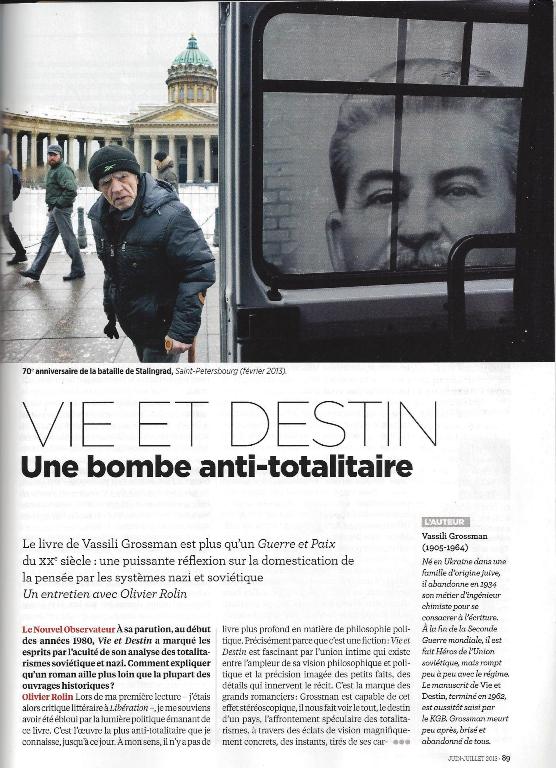 Bác đọc quyển này chưa – 832 trang, bây giờ
bán ở format de
poche rồi. Bác cốp theo kiểu này viết đi, lồng trong chế độ là cảnh đời
của
người dân. Bác có trí nhớ phi thường, bác không viết thì ai mà viết
được. Tks 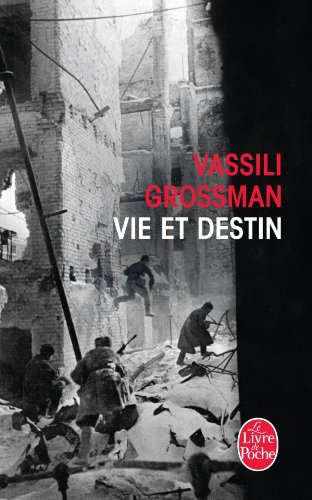 "Mort
de l'esclave
et réssurection de l'homme libre". Dans ce roman-fresque,
composé dans les années 1950, à
la façon de Guerre et paix,
Vassili Grossman (1905-1964) fait revivre l'URSS en
guerre à travers le destin d'une famille, dont les membres nous amènent
tour à
tour dans Stalingrad assiégée, dans les laboratoires de recherche
scientifique,
dans la vie ordinaire du peuple russe, et jusqu'à Treblinka sur les pas
de
l'Armée rouge. Au-delà de ces destins souvent tragiques, il s'interroge
sur la
terrifiante convergence des systèmes nazi et communiste alors même
qu'ils
s'affrontent sans merci. Radicalement iconoclaste en son temps - le
manuscrit
fut confisqué par le KGB, tandis qu'une copie parvenait clandestinement
en
Occident -, ce livre pose sur l'histoire du XXe siècle une question que
philosophes et historiens n'ont cessé d'explorer depuis lors. Il le
fait sous
la forme d'une grande œuvre littéraire, imprégnée de vie et d'humanité,
qui
transcende le documentaire et la polémique pour atteindre à une vision
puissante, métaphysique, de la lutte éternelle du bien contre le mal. Tờ Obs, số đặc biệt về những tuyệt tác của văn học, kể ra hai cuốn cùng dòng, là Gulag của Solz, 1 cuốn sách lật đổ 1 đế quốc, và Vie & Destin của Grossman: Trái bom chống toàn trị. TV sẽ giới thiệu bài phỏng vấn Ovivier Rolin, trên tờ Obs. St-Petersburg 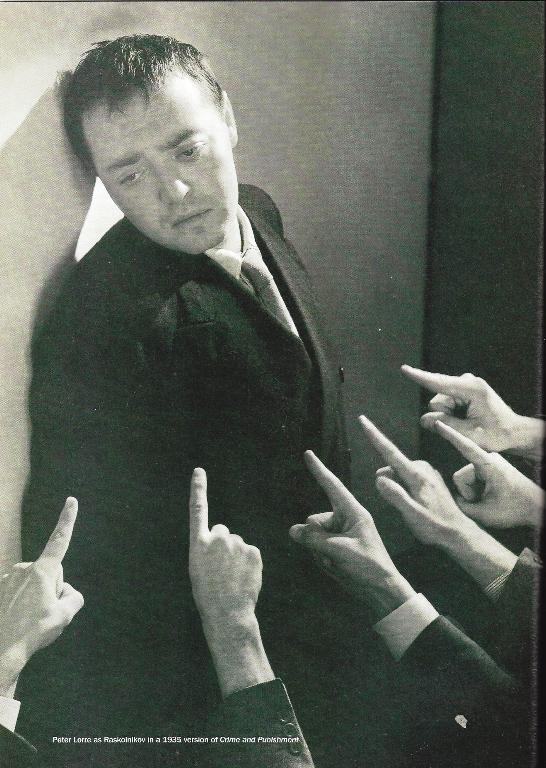 Rodion R. Raskolnikov
Origin:
Fyodor Dostoyevsky's 1866 novel, Crime
and Punishment From Dante's
Inferno, where hell seems a good deal
more interesting than heaven, to Milton's Paradise
Lost, where Satan gets all the best lines, to Shakespeare's Othello, where
Iago's intrigues are more compelling than Othello's virtues, writers
have
learned fiction's dark secret: the allure of evil trumps the banality
of good.
Yet in Fyodor Dostoyevsky's Crime and
Punishment, the author passes rapidly over his main character's
evil deeds-the
pointless murders of an innocent old woman and her half-sister-to
explore their
psychological consequences. Time: The
100 most influential people who never lived, 100 người ảnh hưởng nhất
chưa hề sống. GCC đọc Tội
Ác đúng thời mới lớn, quen BHD, khi chờ Em,
trong 1 quán cà
phê túi của Sài Gòn, cùng những tác giả của thời mới lớn như
Sartre, với Buồn Nôn, Camus
với Kẻ Xa Lạ, Faulkner, và
những tác giả Mác xít như Henri
Lefebvre, Lukacs.. Cùng với những
cuộc phiêu lưu của những tác phẩm lớn ở trong tôi, Sài-gòn trở thành
một sân khấu
cho tôi đóng vai những nhân vật-nhà văn. Thành phố thân yêu, một buổi
sáng đẹp
trời bỗng nhường cho một St. Petersbourg thời Dostoievsky với những cầu
thang
âm u, và cậu sinh viên, trong một góc bàn tại một tiệm cà phê Tầu nơi
Ngã Sáu,
một mình đi lại trong giấc mơ vĩ đại, biến đổi thế giới, làm lại loài
người. 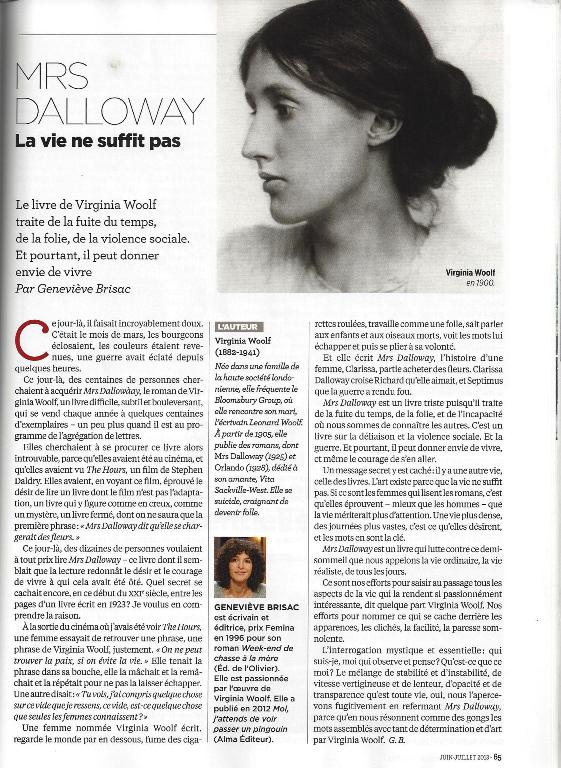 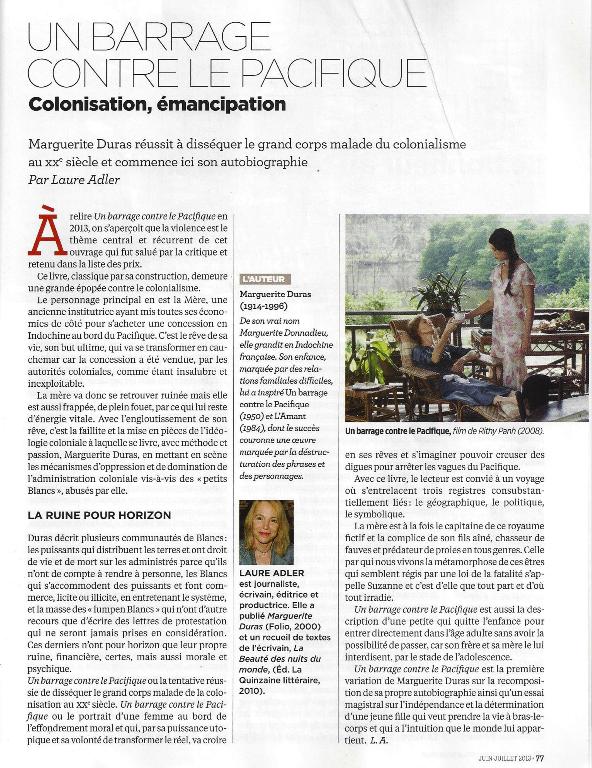 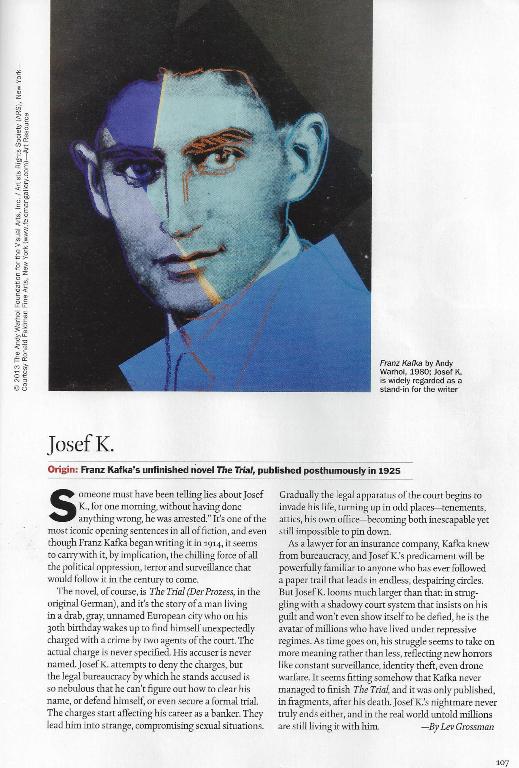 Josef
K. Origin:
Franz
Kafka's unfinished novel The Trial,
published posthumously in 1925 Someone must
have been telling lies about Josef K., for one morning, without having
done anything
wrong, he was arrested." It's one of the most iconic opening sentences
in
all of fiction, and even though Franz Kafka began writing it in 1914,
it seems to
carry with it, by implication, the chilling force of all the political
oppression, terror and surveillance that would follow it in the century
to
come. -By
Lev Grossman Time: The 100 most influential people who
never lived Note: Carlos
Fuentes, trong This I Believe. An A
to Z of a Life; vần K, ông dành cho
Kafka.
Bài viết này cũng thú. 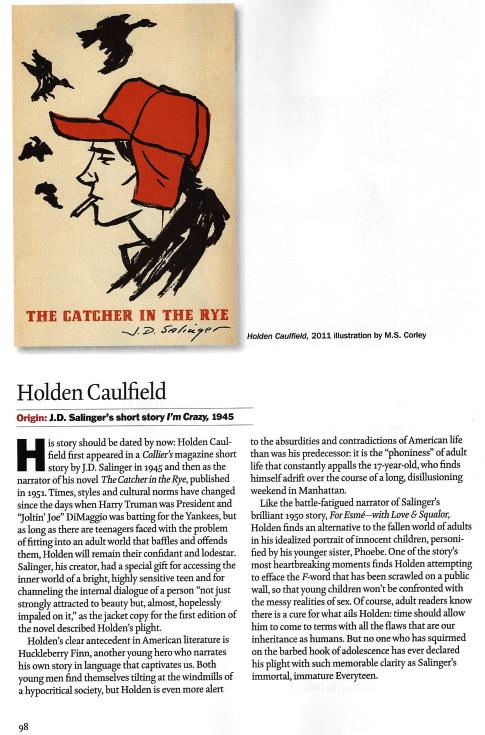 Bắt Trẻ Đồng
Xanh Note: Theo
nhà kinh tế THD, chủ nhân trang “Vịt Thúi Đi”, thì xứ Mít cũng đã có 1
Salinger
rùi.
Cơn mộng đời dẫn tôi tìm lại
Koestler, qua bản dịch tiếng Pháp,
những ngày học Chu Văn An, khi nhà trường còn nằm phía sau trường
Pétrus Ký,
miếng đất sau trở thành Trung Tâm Học Liệu. Đọc và gần như thuộc lòng
một số
câu văn, để trau giồi ngoại ngữ, thâu thập tri thức, tập tành suy
tưởng. Rồi
dần dà theo tuổi học, tuổi đời, tôi lần tới những câu của Camus, con
người nổi
loạn, những khẩu hiệu làm rung động loài người (Bí mật của Vô sản là
cái chết
của Tư bản, thí dụ vậy), những trang nhật ký của Roquentin... Cùng với những cuộc phiêu lưu
của những tác phẩm lớn ở trong tôi,
Sài-gòn trở thành một sân khấu cho tôi đóng vai những nhân vật-nhà văn.
Thành
phố thân yêu, một buổi sáng đẹp trời bỗng nhường cho một St.
Petersbourg thời
Dostoievsky với những cầu thang âm u, và cậu sinh viên, trong một góc
bàn tại
một tiệm cà phê Tầu nơi Ngã Sáu, một mình đi lại trong giấc mơ vĩ đại,
biến đổi
thế giới, làm lại loài người. Hay một London của Dickens, một
buổi chiều đầy sương mù, chú bé
Oliver Twist đói lả người, như tôi, một ngày trong chuỗi ngày cắp sách
đến
trường, đêm đêm làm bồi bàn, thời người Mỹ chưa đổ quân ào ạt vào Việt
Nam.
Thành phố chưa có xa lộ, chưa có cầu Sài-gòn. Và tiệm chả cá Thăng-Long
nơi tôi
tối tối bưng xoong mỡ sôi đổ lên dĩa chả cá, nghe tiếng mỡ kêu xèo xèo,
chưa
biến thành nhà hàng Kontiki ở ngay đầu đường Phạm Đăng Hưng, nơi dành
riêng cho
đám quân nhân Hoa Kỳ. Ngày mai trời sẽ mưa trên thành
phố Bouville 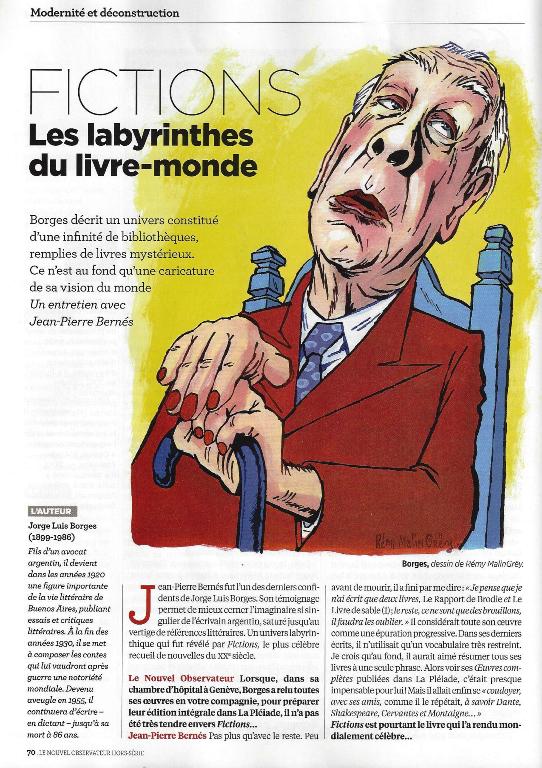 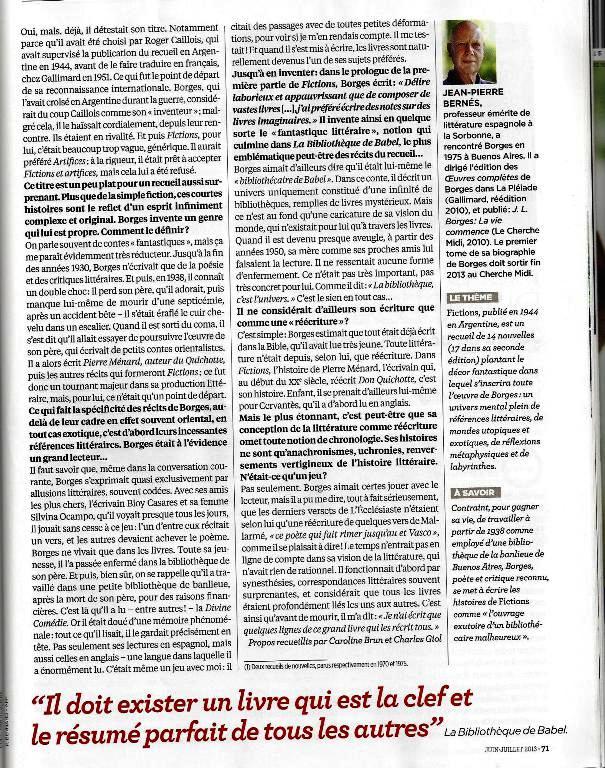 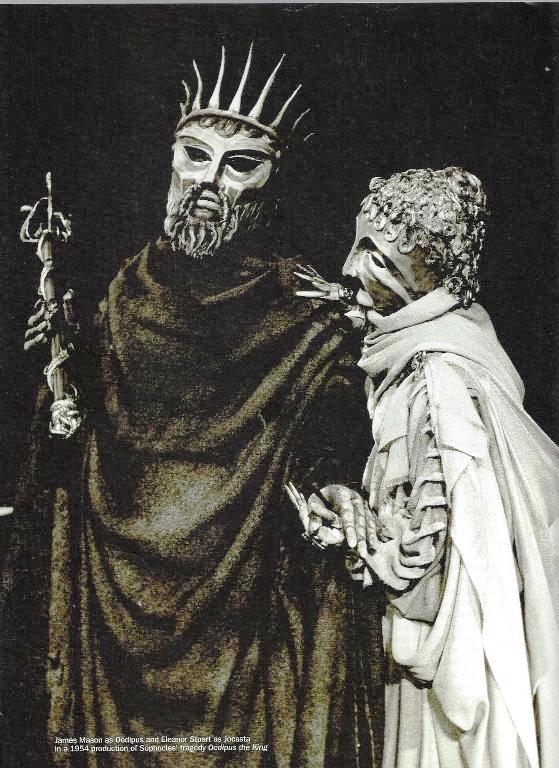 James Mason trong vai Oedipus, và Eleanor Stuart/Jocasta, trong bi kịch Oedipus, được dàn dựng năm 1954 Oedipus Origin:
Greek myths and the 429 B.C. play Oedipus
the King, by Sophocles The story of
Oedipus is one of the most memorable of Greek myths, and it was a
frequent
subject for playwrights. Aeschylus' trilogy on the subject has been
lost, but
Sophocles' play is one of the great works of Western literature, a
lofty
meditation on human nature and the inflexible laws of destiny- as well
as a
rousing detective story that leads audiences to a thrilling catharsis,
the outpouring
of pity and terror that tragedy is designed to inspire. And
so did Sigmund Freud, who claimed that, like Oedipus, each of us is
fated to
want to murder one parent and marry the other. Như Freud phán, mỗi chúng ta đều bị số phận nguyền rủa, mi phải làm thịt ông bố/hay bà mẹ, và lấy người kia, làm chồng/hay vợ! Bài viết trên Time,
về Oedipus, ngắn, gọn, nên vờ đi giai
thoại thực là thú vị, về nhân vật huyền hoặc này. Chính là vì
quá thông minh, mà Oedipus vướng lời nguyền. Thành ra Sophocles mới đặt
vào miệng
của nhân vật của mình, "liệu ta sinh ra quỉ ma như thế ư? “Bửn”,
unclean, đến như thế ư?" 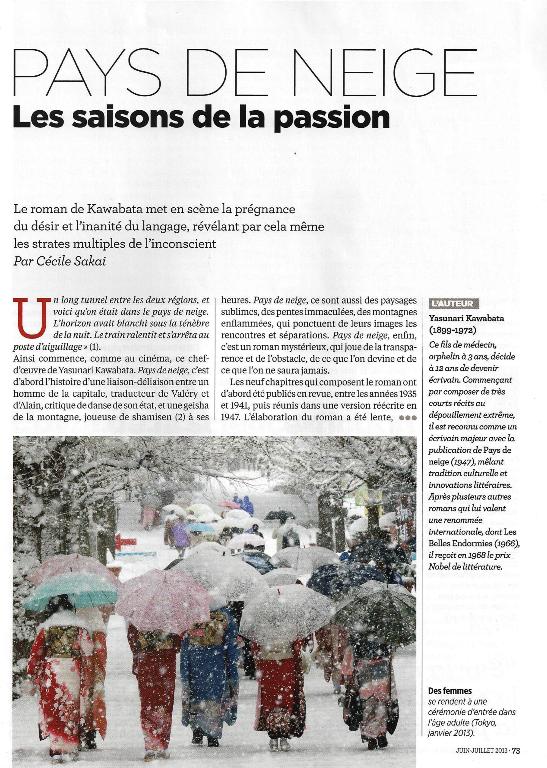 Xứ Tuyết Cấu trúc khởi nguyên [từ này chôm trong nước, La structure originale] của cuốn tiểu thuyết, là từ một truyện ngắn mà tác giả đặc biệt quá mê, được viết năm 1935, Kawabata bèn đi 1 chuỗi truyện ngắn, độc lập, riêng biệt, 12 năm sau, gom lại, biến thành cuốn tiểu thuyết đầu tay. “Trên núi đã trở nên âm u vào lúc hoàng hôn, bên trên cây cầu, tuyết đầu tiên đã đặt để cái trắng toát của nó: Sur la montagne déjà sombre dans le crépuscule, au-dessus du pont, la première neige posait sa blacheur" Rằng, cái chuyện, Kawabata, sinh cùng năm với Borges, Nabokov, hay Hemingway, không làm chúng ta ngạc nhiên. Cécile Sakai Hamlet is
reborn as a Choose Your Own Adventure Much scholarly commentary has been expended on Shakespeare's Hamlet, maybe more than on any other play in the English language, but I don't think it's ever been said of Hamlet that it would make a good Choose Your Own Adventure novel. Nevertheless: that was the pitch that a 32-year-old Canadian writer named Ryan North made last November on Kickstarter. North figured it would take about $20,000 to produce To Be or Not to Be: That Is the Adventure. The Internet disagreed. It gave him $580,905. Hamlet cũng là
1 trong 100 nhân vật ảnh hưởng nhất chưa từng hiện hữu, qua bình chọn
của Time.
Des mots, des mots, des mots. Shakespeare “Polonius :
- Que lisez-vous, Monseigneur? - Hamlet : - Des mots, des mots, des
mots." D.M.Thomas cho biết, Hamlet, ngay từ thoạt kỳ thuỷ của thời đại Stalin, đã bị cấm. Tuy không chính thức, nhưng đám cận thần đều biết, Stalin không muốn Hamlet được trình diễn. Trong một lần tập dượt tại Moscow Art, Stalin hỏi, có cần thiết không, thế là dẹp. Vsevolod Meyerhold, đạo diễn, người ra lệnh Pasternak dịch Hamlet, đành quăng bản dịch vô thùng rác, nhưng ông tin rằng, nếu bất thình lình, tất cả những kịch cọt đã từng được viết ra, biến mất, và may mắn sao, Hamlet còn, thì tất cả những nhà hát trên thế gian này đều được cứu thoát. Chỉ cần diễn hoài hoài kịch đó, là thiên hạ ùn ùn kép tới đầy rạp. Tuy nhiên, cả đời ông, chẳng có được cơ may dựng Hamlet. Nguyễn Huy Thiệp phải đợi 30 năm sau khi cuộc chiến chấm dứt, phải đợi chính đứa thân yêu của ông ngập vào ma tuý, mới nhìn ra vóc dáng ông hoàng Đan Mạch, và sứ mệnh bi thảm của hắn: Giết bố!Ui choa, chẳng lẽ cái cảnh biểu tình, là để… giết ông bố Bắc Kít? Amen! 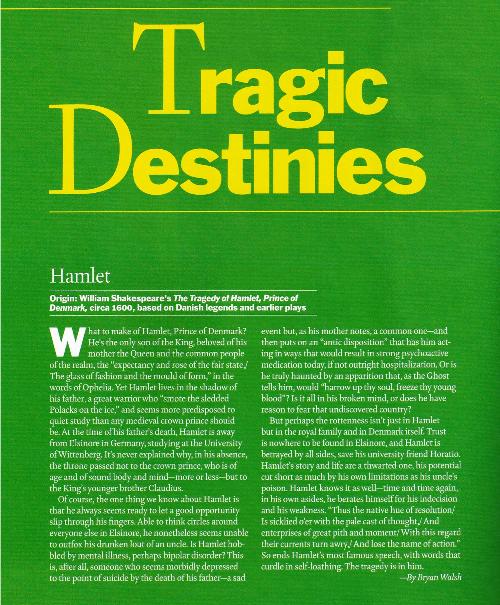 Một mình ta gọi ông ta là Bố, là đủ rồi. Ta không muốn mi lấy ta và phải gọi ông ta là Bố! ZHIVAGO'S POEMS
HAMLET Bản tiếng Anh The noise is stilled. I
come out on the stage. The darkness of night is
aimed at me I love your stubborn
purpose, Yet the order of the acts
is planned Bản tiếng Tây Tout se tait. Je suis
monté sur scène, Et je suis la cible des
ténèbres Ton dessein têtu, pourtant
je l'aime, Rien ne peut changer le dénouement. Je suis seul. Les pharisiens sont maîtres. Vivre, ce n'est pas franchir un champ. Bản tiếng Mít Tiếng ồn tắt ngấm. Tôi bước lên
sàn diễn Tôi trở thành cái đích của đêm
đen Con yêu cái ý định bướng bỉnh
của cha. Nhưng, lệnh lạc đã được phát ra, Tục ngữ Nga 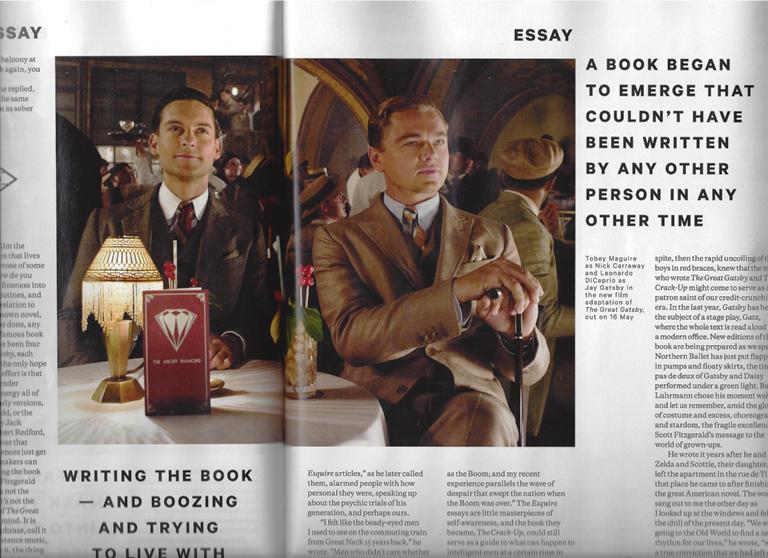 Trên tờ Esquire,
June, 2013 có bài “Gatsby Thần Kỳ” thật tuyệt. Thuổng Dos, tác giả bài
báo, sau khi tự hỏi, Tại làm sao Gatsby
vẫn làm phiền chúng ta, Why Gatsby
Still Matters, bèn trả lời: Chúng ta đều là những hậu duệ của Scott
Fitz, We
are all Scott Fitzgerald’s children now.
|


